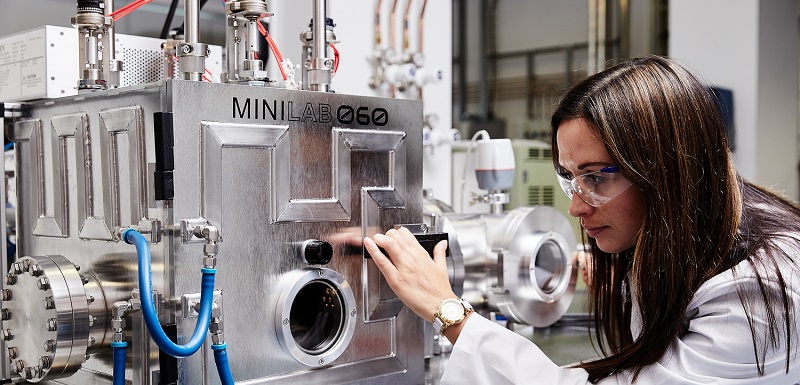Opinion | Thursday, 9th July 2020
How hydrogen technology could help restore a greener UK
University experts explain the potential of hydrogen power following government pledge

Prime Minister Boris Johnson has pledged to build back a "greener" UK as part of the economic recovery from the Coronavirus (COVID-19) slump, highlighting the need for the UK to become leaders in so-called net zero CO2 emission technologies.
To achieve its goals, the government has promised £5bn to kick off this industrial revolution focusing on innovation to re-build British industry and to bring new jobs and skills for generations to come.
In particular, the PM has called on hydrogen technologies as part of this vision. But why hydrogen?
Dr Laurie King, Senior Lecturer in Chemistry, Dr Yagya Regmi, Research Fellow, and Dr Justyna Kulczyk-Malecka, Post-doctoral Research Associate at Manchester Metropolitan University’s Manchester Fuel Cell Innovation Centre, explain where hydrogen technology can be applied and offer their recommendations for the UK’s future hydrogen economy.
Hydrogen for transport
At the Manchester Fuel Cell Innovation Centre, our research focuses on hydrogen technology because we believe hydrogen power represents a viable pathway to decarbonisation at a sufficiently feasible scale of the energy, industry and transportation sectors.
The use of hydrogen fuel cells in transport is so far the most developed strand, with cars, vans, buses and heavy goods vehicles (HGVs) now commercially available.
When it comes to hydrogen, focus has been on bus and HGV fleets that return to the same depot every day, as the use of hydrogen technology in these vehicles offers a promising platform for infrastructure investment and building confidence - while also having the greatest impact on air quality and meeting net zero 2050 targets.
For long distance HGVs, hydrogen-diesel hybrid options are available and also in use.
When it comes to the rail industry, hydrogen-powered trains have been successfully deployed in Europe, replacing harmful diesel vehicles.
However, there is still work to be done in the UK to reform rail franchise arrangements and make hydrogen power rail a viable option.
WATCH: What is a hydrogen fuel cell?
Hydrogen for industrial heating
Decarbonisation of domestic and industrial heating remains one of the most difficult challenges in meeting the UK’s 2050 net zero targets.
Analysis by the Institute of Engineering and Technology has identified that only district heating or hydrogen-fuelled heating gives comparable heat performance to the existing natural gas arrangements.
A number of projects are underway to explore both the full replacement of the natural gas supply with hydrogen, such as Hy4Heat and Leeds Citygate, or the use of a hydrogen/methane mixed gases supply, like HyDeploy or HyNet.
Hydrogen production
One of the challenges associated with the transformation to a hydrogen economy is the generation of affordable and carbon emissions-free hydrogen.
Today, the majority of hydrogen produced is derived from fossil fuels, resulting in carbon dioxide emissions known as ‘grey hydrogen’.
Capturing and storing this carbon dioxide is known as ‘blue’ hydrogen – but this process increases production costs.
It is widely anticipated that these carbon capture technologies will provide a launch pad for decarbonising heating, but this will require substantial investment in blue hydrogen production and distribution infrastructure.
‘Green hydrogen’ uses electrolyser technology and renewable electricity such as solar or wind power to generate hydrogen – but at this time, this is the least cost-effective route.
Why? Well, the price of green hydrogen is largely based on the capital costs associated with electrolysers in additional to the renewable electricity prices.
With that in mind, there needs to be substantial investment and innovation in renewable hydrogen technology and further research and development to reduce the cost of green hydrogen.

Jobs and skills for decarbonisation
In September 2019, the Manchester Fuel Cell Innovation Centre led a Northwest Clean Energy Skills Summit with industry, public sector and educational institutes, which identified skills shortages in green hydrogen, hydrogen storage and fuel cells across the full range of skill levels that need to be addressed.
The development of these skills will only be possible in the UK with government support and through industry-academia collaboration to develop and investigate promising technologies and associated fundamental science.
Similar to the £245m investment the UK government has made through its Industrial Strategy Challenge Fund for the development of battery technology, this investment is anticipated to have a significant impact on economic growth.
For example, the economic assessment of the HyNet project expects that a switch to hydrogen technology will result in 85,000 years of employment in the North West and 130,000 years in the UK by 2050 – amounting to an additional £14bn in the North West and £26bn for the UK.

Our recommendations
To realise the PM's vision for the UK’s hydrogen economy, investment over the next decade is critical.
Our recommendations are:
• To review the capacity of the UK's electrical grid to support the installation of electrolysers for the production of clean and green hydrogen for the transportation sector
• To install hydrogen-refuelling infrastructure in strategically identified locations for fleets of local travel vehicles including emergency services vehicles, public buses, refuge collection trucks, local delivery HGVs and forklift trucks in warehouses
• Develop a hydrogen policy that focuses on the air quality and rapid re-fuelling for HGVs and buses
• Introduce incentives for investment in infrastructure to encourage the use of dual-fuelled hydrogen and internal combustion engine-powered vehicles for long distance vehicles
• Provide support for investors in hydrogen-powered trains where electrification is not possible within revised rail franchising agreements
• Support industrial investments in either bulk ‘blue’ hydrogen production facilities at multiple locations where carbon capture storage and utilisation is feasible, or ‘green’ hydrogen
• Identify and address the skills gap and challenges facing green technology and industry in the UK at all education levels to facilitate sustained growth of hydrogen economy and aid economic recovery from COVID-19
• Establish funded government programmes that support joint industrial-academic partnerships focused on delivering clean hydrogen




